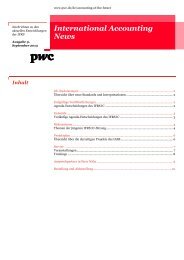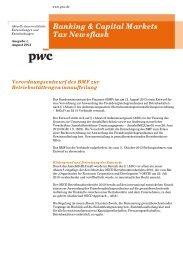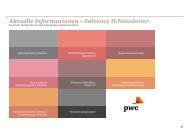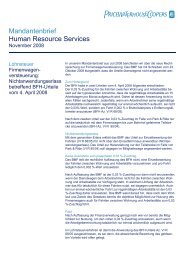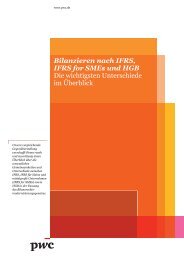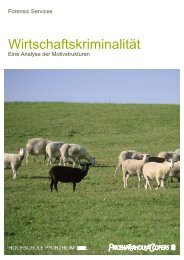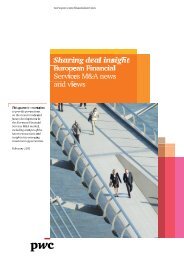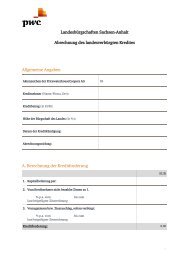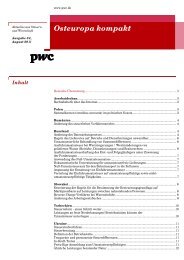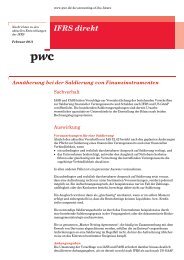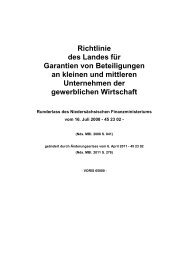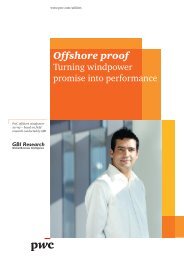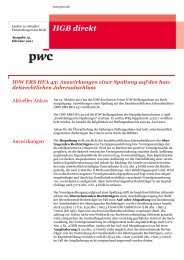Emerging Trends in Real Estate® Europe 2012 - PwC
Emerging Trends in Real Estate® Europe 2012 - PwC
Emerging Trends in Real Estate® Europe 2012 - PwC
You also want an ePaper? Increase the reach of your titles
YUMPU automatically turns print PDFs into web optimized ePapers that Google loves.
ExHIBIT 1-6<br />
<strong>Real</strong> Estate Bus<strong>in</strong>ess Issues for <strong>2012</strong><br />
Impact of Regulation<br />
Impact of Susta<strong>in</strong>ability<br />
Impact of Sovereign Debt Crisis<br />
Source: <strong>Emerg<strong>in</strong>g</strong> <strong>Trends</strong> <strong>in</strong> <strong>Real</strong> Estate <strong>Europe</strong> <strong>2012</strong> survey.<br />
global cities such as London, the “gold bar of real estate,” are<br />
not perceived as entirely watertight. Even aga<strong>in</strong>st this backdrop,<br />
however, do<strong>in</strong>g noth<strong>in</strong>g is not a survival strategy for the<br />
long term, and as the market prepares for what some refer to<br />
as a Japan-like “lost economic decade” <strong>in</strong> <strong>Europe</strong>, the game<br />
for <strong>2012</strong> is about flourish<strong>in</strong>g <strong>in</strong> spite of what is out there.<br />
Strategies must be created without much faith <strong>in</strong> the<br />
outside world—be it the economy, banks, occupiers, capital<br />
values, or capital-rais<strong>in</strong>g capabilities. And decisions must<br />
be guided by rigorous underwrit<strong>in</strong>g, focus on cash flow and<br />
capital expenditure with few assumptions about much else. “If<br />
you assume no economic growth, then the economic situation<br />
isn’t relevant to what I am do<strong>in</strong>g,” said one.<br />
This means that <strong>in</strong> <strong>2012</strong>, ask<strong>in</strong>g <strong>in</strong>terviewees about their<br />
favoured sectors, cities, or countries reaped little reward: very<br />
little can be depended upon or viewed as a wholesale mustbuy.<br />
Unable to def<strong>in</strong>e concrete opportunities, <strong>in</strong>terviewees<br />
said that <strong>in</strong>stead they preferred to pursue eclectic <strong>in</strong>vestment<br />
strategies.<br />
“Everyth<strong>in</strong>g is so property specific that we are now stay<strong>in</strong>g<br />
away from mak<strong>in</strong>g judgments about asset classes. <strong>Real</strong><br />
estate has become a very granular bus<strong>in</strong>ess—there are<br />
so many different possible outcomes. You have to underwrite<br />
each specific situation on its own merits. For the right<br />
<strong>in</strong>vestors, skill sets, and capital, <strong>in</strong>credible <strong>in</strong>vestments are<br />
possible. But lots of questions need to be answered before<br />
you do anyth<strong>in</strong>g.”<br />
“How do you make money?” asked one. “The ultimate<br />
challenge is that <strong>in</strong> this zero-growth, zero-yield compression<br />
market, it’s about grow<strong>in</strong>g with no growth.”<br />
“Economies do not have to rebound. They can become<br />
flat for a long time, and that is what we are fac<strong>in</strong>g. You just say,<br />
‘Okay, <strong>in</strong> a flat economy, what is go<strong>in</strong>g to happen?’ Will ports<br />
be abandoned to cut costs? That could be excit<strong>in</strong>g. Or perhaps<br />
the U.K. will build a mega-airport <strong>in</strong> the Thames Estuary<br />
and <strong>in</strong>frastructure will be a mechanism for growth. It doesn’t<br />
mean we all have to jump off the bridge.”<br />
6 <strong>Emerg<strong>in</strong>g</strong> <strong>Trends</strong> <strong>in</strong> <strong>Real</strong> Estate ® <strong>Europe</strong> <strong>2012</strong><br />
Increase Stay the Same Decrease<br />
59% 38% 3%<br />
51% 45% 3%<br />
55% 23% 22%<br />
0% 20% 40% 60% 80% 100%<br />
Depressed Appetites: The Banks<br />
“It is very hard to have a strategic plan for next year,” said one<br />
property lender. “I do have plans, but a lot of it is reactionary.<br />
It is not a good time to be a property banker.” It is not a good<br />
time to need a property banker, either. Property <strong>in</strong>vestors<br />
are hav<strong>in</strong>g a tough time mak<strong>in</strong>g themselves heard above the<br />
multitude of issues banks are fac<strong>in</strong>g from all directions, and<br />
that theme is set to <strong>in</strong>tensify <strong>in</strong> <strong>2012</strong>.<br />
Property bus<strong>in</strong>esses of some lenders are struggl<strong>in</strong>g to justify<br />
themselves to management boards. “We face questions<br />
<strong>in</strong>ternally, such as how much has property lost the bus<strong>in</strong>ess<br />
over the last four years, is real estate mak<strong>in</strong>g money for the<br />
bank today, and will it make money for the bank <strong>in</strong> the future? I<br />
expect many of my peers are the same,” said one.<br />
What everyone knows is that the downward pressures are<br />
larger than the <strong>in</strong>dustry, and that is what makes the situation<br />
so dire. The credit quality of legacy loans is not necessarily<br />
forc<strong>in</strong>g banks out of the market; the liquidity and balance<br />
sheet of Eurohypo’s parent company, Commerzbank, and<br />
wider macro-economic factors prompted the suspension.<br />
“Banks have to raise significant amounts of money over<br />
the next six months. Assum<strong>in</strong>g they manage to do all of that,<br />
governments will put banks under pressure to lend, but property<br />
is not a priority over consumers and corporations.” “There<br />
is a complete lack of understand<strong>in</strong>g from borrowers about<br />
what banks are go<strong>in</strong>g through. Eurohypo stopped lend<strong>in</strong>g,<br />
and people took it personally. It was simply the parent shr<strong>in</strong>k<strong>in</strong>g<br />
the balance sheet.”<br />
As those stra<strong>in</strong>s on balance sheets promise to <strong>in</strong>crease<br />
this year, banks will become <strong>in</strong>creas<strong>in</strong>gly picky about the<br />
types of clients they take on and the types of bus<strong>in</strong>ess they<br />
do. “If it is long dated, capital <strong>in</strong>tensive, we are shy<strong>in</strong>g away<br />
from it—and that <strong>in</strong>cludes property.”<br />
And if, after all of that, any hunger is left to lend, regulators<br />
will cont<strong>in</strong>ue to do their best to suppress it, by ensur<strong>in</strong>g<br />
banks manage the level of property lend<strong>in</strong>g <strong>in</strong> their books.<br />
“My feel<strong>in</strong>g from the FSA [F<strong>in</strong>ancial Services Authority] is that



